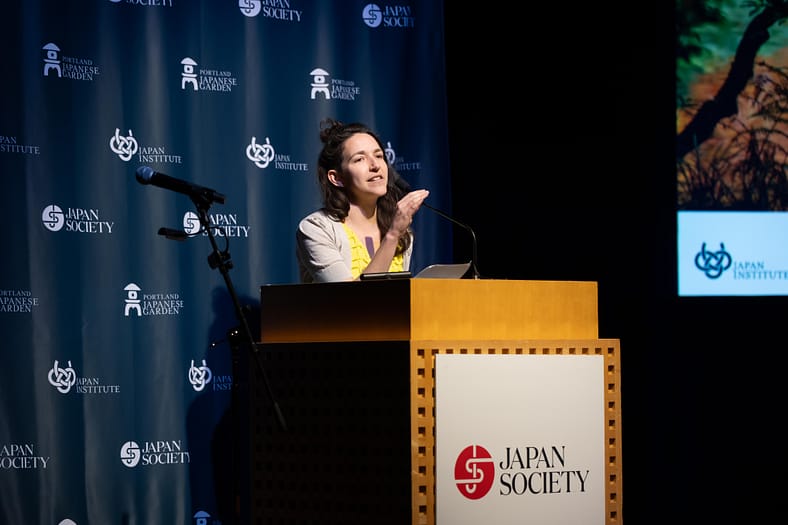
The signature programming of Japan Institute’s International Exchange Forum is its Peace Symposia, which features leaders from numerous cultural, intellectual, and diplomatic fields coming together for presentations and panel discussions on the topics of culture, art, nature, peacemaking and public spaces. Thus far, they have been held in Tokyo, London, New York, Cape Town, and Johannesburg, with more planned in the years to come.
On September 21, the United Nations’ International Day of Peace, Japan Institute held its third Peace Symposium at Japan Society in New York, New York, U.S. Among the many highlights of this free and public event was a commissioned poetry reading by Nomi Stone, work that is available to read below. Stone was selected by Japan Institute and The Poetry Society of the U.K., a globally respected organization founded in 1909 that advances poetry through its publications, competitions, and collaborations with international organizations.
Stone, a poet, anthropologist, and author of three books is winner of a Pushcart Prize and a Fulbright. Her poems have appeared in The Atlantic, The Nation, The New Republic, POETRY Magazine, American Poetry Review, and Best American Poetry, among others. Stone was most recently a postdoctoral researcher in anthropology at Princeton University, and she is currently an Assistant Professor of Poetry at the University of Texas, Dallas.
Joining Stone at the Symposium were the winners of the Poetry Society’s Young Poets Network challenge, Mayah Pico, Hana Widerman, and Yvanna Vien Tica.
At the conclusion of all its Peace Symposia, Japan Institute plans to publish a book of the poetry that has been included in their programming.
This Maze Isn’t Heaven by Nomi Stone
My son pushes his tiny lawn-mower down the street
the week our state requires children
to learn how to use bleeding control stations. At night
I tell him the pit-pit-pit is thunder. How
can I tell him the darkness comes out of a person?
Our shadows fly each other like kites.
Ankle-deep in the marigolds, I spray him
with the hose as my wife weeds her lettuce, spinach, beets,
dill and mint. Oh Dallas, oh America. We cross
the ocean when we can
to my wife’s country with its dark, silent nights,
long days of shimmying on our bellies, collecting
mushrooms in the moss, as our dog sitter sends
alerts from his phone: person shot,
1.1 miles away. Vehicle stolen 300 feet away. We slip
the dried mushrooms into our suitcase,
whiffs of butter, leaves, dirt. Will you shame me,
Dallas, for leaving? Are you ashamed of what
I return to? On the playground, the casing
of a bullet. The daycare––the door is unlocked.
Our green path, flowers as tall as a boy, where
we saw the Coroner drive past. Even our own
street where this spring a bullet landed inside
another child’s body. Across the street
is Jimmy who keeps voting against our lives.
But we walk right over, carrying the mushrooms
we foraged: fruity, smelling of earth. Then, arms still full,
to our neighbor Sarah, whose daughter jumps on the trampoline
with our son. To Kim, who leaves us bags of baby clothes
and macaroni and cheese and Shilyh, who picked us up
at the airport. And Jimmy: milk-pale and ill
at the door, behind him the drum of a talk show,
telling him who to hate. But when he sees us, he hands us
Hershey bars—“Will you come over tomorrow, girls?”
You can become a person to someone else, can’t you,
and be less lonely? This maze
isn’t Heaven, but here is our way through it. It’s spring
and it’s Passover, so we invite everyone for dinner on our porch.
Annie and I rewrite the freedom story about our people
we’d read aloud every year as children,
to tell a bigger story with absolutely everyone in it.
It’s true: the world is not the one
we wanted. Still, each time we do the hand washing ritual,
we try to become someone new
to not return to where we started. My love
roasts lamb and carrots, adds
the inky forest into the broth. Shilyh brings her ukulele.
I lay poems around the table.
Our child climbs from lap to lap. Every time a song ends,
he yells out: “More singing!”
Poetry Read at Japan Institute’s International Peace Symposia
Japan Institute’s peace programming, including the New York Peace Symposium, is made possible through Robert and Deborah Zagunis.
